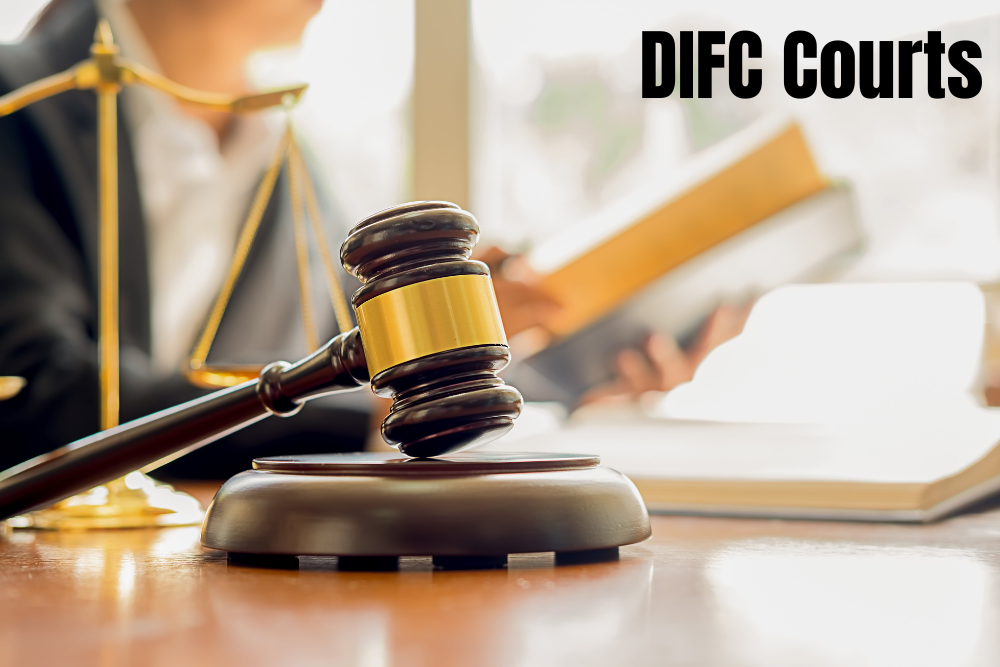Introduction:
This question often comes to the mind of the readers. What Are DIFC? DIFC is the abbreviation of Dubai International Financial Centre which stands as a beacon of growth in the world. It was established in 2004 and within no time it has become a financial hub. Its dynamic features for finance, business, and innovation, have taken a central position in the East and the West. The Dubai International Financial Centre (DIFC) Courts have been established to provide a legal way to resolve financial issues within the United Arab Emirates (UAE), after the establishment of these Courts in 2004, Dubai’s legal infrastructure has become legally dominant and it is the basic reason for trust of people on UAE for business and trade from all over the world. A developed legal system assures investors internationally to rely on this efficient dispute resolution mechanism. Through this article, we will discuss these Courts and examine their jurisdiction along with other different aspects such as functions, significance, and prospects.
Historical Background:
With the extraordinary growth of Dubai financially, Dubai’s visionary leadership recognized the need for a proper legal system to resolve financial disputes and to create a progressive environment for investors from all over the world. Thus, in 2004, the Government of Dubai launched DIFC, to make Dubai a financially reliable state with its legal framework. The purpose of this move was to attract international financial institutions from all over the world to Dubai. The significance of these Courts can easily be understood as it made Dubai a leading financial hub in the Middle East. The DIFC Courts were created to provide a legal framework according to international standards for dealing with commercial matters.
Structure and Governance:
DIFC operates within Dubai as an autonomous jurisdiction and is governed by its laws and regulations. It is a governing body that is responsible for operations, development, and strategic direction. Additionally, these Courts have an independent judicial system with punishment according to Islamic laws as UAE is an Islamic country. These Courts have been specially designed to ensure transparent and efficient resolution of commercial disputes. A developed legal system assures investors internationally to rely on this efficient dispute resolution mechanism.
Jurisdiction and Scope:
One of the defining features of these Courts is their jurisdictional scope over civil and commercial matters occurring within the DIFC which is a designated financial free zone in Dubai. The jurisdiction of the DIFC extends to both local and international parties and makes these Courts an attractive forum for resolving cross-border disputes. Additionally, these Courts offer a conduit jurisdiction, allowing parties to enforce judgments in other jurisdictions through reciprocal arrangements.
Structure and Composition:
The structure of the DIFC Courts ensures independence, impartiality, and efficiency in financial disputes between the parties. The Courts comprise two primary entities including the Court of First Instance and the Court of Appeal. The Court of First Instance hears original cases and is the trial court, while the Court of Appeal is an appellate court just for review of decisions made by the lower court. Both courts are staffed by experienced judges with expertise in common law principles. The significance of these Courts can easily be understood as it made Dubai a leading financial hub in the Middle East. The DIFC Courts were created to provide a legal framework according to international standards for dealing with commercial matters.
Procedural Framework:
The procedural framework of these Courts is based on common law systems that provide familiar processes for parties. Parties have access to a range of dispute resolution mechanisms which include litigation, arbitration, and mediation. The DIFC Courts’ procedural rules prioritize efficiency and transparency, with streamlined processes aimed at resolving disputes in a timely and cost-effective manner. These Courts offer a conduit jurisdiction, allowing parties to enforce judgments in other jurisdictions through reciprocal arrangements.

Significance in the Global Legal Landscape:
These Courts occupy a unique position within the global legal framework serving as a bridge between common law and civil law jurisdictions in Dubai. establishing these courts reflects Dubai’s visionary leadership’s commitment to establishing a friendly environment for business and promoting an international trade system. Furthermore, the DIFC Courts contribute to the development of commercial law by resolving cross-border financial disputes. The establishment of these Courts has increased the standard of Dubai as a global financial hub. The strategic location of Dubai along with a business-friendly environment, has attracted multinational corporations from around the world to come to Dubai for trade. It has also played a central role in facilitating cross-border trade and investment and now serving as a gateway to the Middle East, Africa, and South Asia markets.
Functions and Offerings:
These Courts offer a comprehensive range of services to meet the needs of traders from different parts of the world to Dubai. As the UAE is a financial center for hosting a plethora of banks and asset management firms, DIFC provides a regulatory framework, ensuring compliance with international standards with best practices. This regulatory environment gains the confidence of investors and businesses globally and thus takes part in economic stability.
Challenges and Future Outlook:
Despite their success, these Courts also face different kinds of challenges to maintain their relevance in an evolving legal landscape. The rise of alternative dispute resolution mechanisms, technological advancements, and geopolitical shifts pose both opportunities and threats to these Courts. DIFC has also played a central role in facilitating cross-border trade and investment and now serving as a gateway to the Middle East, Africa, and South Asia markets.To remain in the top position of the world legal framework the Courts must adapt to changing market dynamics and embrace innovation in dispute resolution.
Future Prospects and Challenges:
Looking ahead, it is dealing with continuous growth and expansion with success. With ambitious initiatives such as DIFC the central aim of this court system is to give further strength to judicial procedure for the welfare of the people. Dubai is a leading financial hub and focuses on innovation, sustainability, and inclusivity. However, it faces several different kinds of challenges such as geopolitical uncertainties, regulatory changes, and competition from emerging financial centers etc. To Address all these challenges, these Courts have to take proactive measures to adapt to evolving market dynamics while maintaining regulatory integrity and
Read also: Lawyers in Dubai/Criminal Lawyers in Dubai
Conclusion:
What is difc? These are Dubai’s courts.The DIFC Courts represent the UAE’s legal framework which offers a platform for resolving commercial disputes. DIFC is the abbreviation of Dubai International Financial Centre which stands as a beacon of growth for the whole of the world. It was established in 2004 and within no time it has become a financial hub for the business community from all over the world. Its dynamic features have taken central positions in the East and the West. As these Courts are evolving continuously, their significance is increasing regularly in the global legal framework of the world. It is contributing to the advancement of commercial law and also the facilitating of international trade and investment. In conclusion, Dubai International Financial Centre stands as a testament to Dubai and its thriving financial ecosystem. It has evolved into a global powerhouse with every passing day. As it continues its progress in the ever-changing global financial picture the world, DIFC remains committed to driving sustainable development and prosperity for Dubai. This regulatory environment gains the confidence of investors and businesses globally and thus takes part in economic stability.


